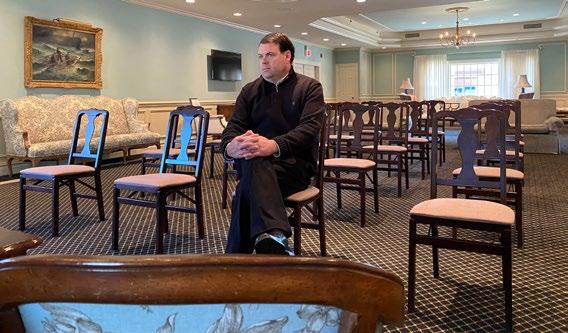
3 minute read
GRIEVING AND LONELINESS DURING COVID-19 PANDEMIC
BY SCOTT JONLICH
Funeral homes in Illinois are essential services that have an unfortunate and difficult challenge with the COVID-19 pandemic. Both the families who have lost loved ones and the funeral home operators themselves face daunting obstacles during the grieving process.
Advertisement
Brian Sullivan of Sullivan Funeral Home Services in Hinsdale is a fourth-generation owner and operator in the family business. Sullivan talked with Hinsdale Magazine to discuss the increased challenges and hardships families now face when grieving.
It is almost impossible to think that only a few months ago, we would see the last of large public funerals and wakes for the near future.
“Anytime there is a loss, it’s tough for a family," Sullivan said. "Not only is there a loss, but we are under restrictions during a time when a family gets together with friends to express feelings and emotions, and it's very tough when they are limited to groups of ten and under. We all understand the guidelines, and it’s the right thing to do now; but it’s really affecting the grieving process for families.” Sullivan said before Illinois went to the ten person and under rule, funeral homes were under the restriction of 50 people at a time, and even at 50, it was difficult for families to pick and choose who could come. "Thankfully, families had the opportunity to say prayers and remember their loved ones in a close and personal way," he said. Sullivan said his company is "trying to think outside the box" in its desire to make the families more comfortable as they honor their loved ones.
“We had people spread out during the procession down the block, holding signs, hearts and pictures," he said. "Some of the things that friends and neighbors have done in the community [have] really been neat.” Sullivan and his staff are doing their best to work with the restrictions, but the thing that hits him the most is that widows and widowers who lost a spouse under the restrictions cannot be around grandkids.
“They are at home right now, and they can’t even be around their friends, which is a tough thing in a grieving process," he said. Sullivan said the Illinois guidelines are “absolutely appropriate,” and thinks the ten and under order is what needs to be done for safety.
“I think it's our job as funeral professionals to get creative," he said. "We have been doing live-streams. People have done FaceTime. I had a group of kids in a parking lot just waving during the procession. If we have to do things in shifts with 30 people in a family, we have them come in 20-minute shifts, ten at a time.”
But it's not just the emotional toll families are dealing with during the funeral services: it’s the days and weeks after that are the most difficult for those who remain in solitude, with only their thoughts about the one they just lost. "I say this to every spouse, every son and daughter, and that’s to keep your mom or dad busy,” Sullivan said. “Make sure you take them out to dinner or to your house in the next couple of days, weeks and months. They can’t do that right now, so every family that I have been working with, I tell that family to keep calling. For those who could not come to the service, because it had to be private, I tell them to keep reaching out to them; send them a card. "What happens a lot when people experience a loss, their friends come to the wake, and they’re all there for the service; but a lot of time friends are afraid to call for awhile, because they want to give that person some privacy, some space.” Sullivan said that people think the widows and widowers are being bombarded by phone calls, so they leave them alone. He hears from families that it gets quiet afterwards.
“I can only imagine how quiet it is right now," he said. "It’s important that if you know the family who experienced a loss, just check on them. Call them and see how they are doing.” ■











